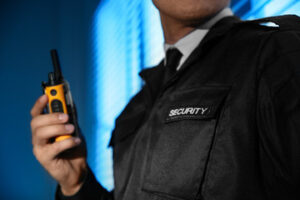Exploring the Vital Role of Security Guards

Security guards keep businesses, people, and property safe in various settings. They have the training and expertise to identify suspicious behavior and contact authorities as needed.
Security guards also perform safety checks and provide customer service. They are often stationed outdoors to manage crowds, monitor transportation hubs, or secure outdoor events.
Security Officers use their knowledge of crime prevention, risk assessment and emergency response protocols to keep a watch over facilities, equipment and people. This could include patrolling an area on foot or in a vehicle, monitoring surveillance systems, checking credentials and ensuring that only authorized individuals enter buildings. If an alarm or disturbance is detected they alert police and other authorities to assist with an investigation, while remaining calm to defuse the situation as much as possible.
It is not uncommon for Security Officers to interact with visitors or other employees, so strong customer service skills are important. They must also be punctual, as their duties may require them to respond to an emergency situation quickly and effectively. A Security Officer’s detailed recollection of events can also aid first responders during investigations.
Many businesses use Security Officers to ensure that their employees and assets are secure at all times. It is not feasible for a business owner to expect their employees to have the experience or skill set to know what to look out for, so having someone on hand who can spot the unusual can be invaluable. In addition, Security Guards can be called on to help with emergency situations when it is deemed necessary to restrain an individual or otherwise protect people.
Other states have their own licensing requirements, but the majority of states require all security officers to complete basic training courses. This includes classes that teach them the fundamentals of their particular role, as well as the laws and regulations that govern them. Some guards receive additional training to become certified in specialized areas, such as terrorism awareness and armed security.
A security guard’s main role is to prevent and deter unauthorized activity, such as theft, vandalism and property damage. They will patrol a facility in set intervals, monitor surveillance equipment and check credentials for all who enter the building. They will also keep a log of daily activities, report any issues to their supervisor and may be required to search bags or other items upon entry.
Some Security Officers are required to perform escort services for people leaving or entering the property, as well as for visitors and guests at corporate functions. This can require a great deal of physical exertion, and it is vital that they are physically fit. They are also often required to stand for long periods of time, which can lead to back and foot problems. It is therefore important for them to be properly hydrated, and to wear comfortable footwear. Depending on the size of the facility, they may need to operate metal detectors or x-ray machines. Guards are also required to have a high level of active listening, critical thinking and problem sensitivity.
Security Guard
As their name suggests, security guards serve as a physical deterrent to criminal and unwelcome behavior. They monitor and patrol their assigned areas, and they perform detailed safety checks to ensure that fire exits, alarms, and other security equipment are functioning properly. Security guards also often interact with customers, employees, and visitors, providing information and assistance as needed in a courteous and professional manner.
Security guards often work in a wide variety of settings, including office buildings, corporate campuses, and industrial facilities. They may also serve in healthcare settings, where they protect patients, visitors, and staff members, manage access to restricted areas, and monitor surveillance systems. Other common security guard jobs include working at schools, colleges, and universities, monitoring entrances and ensuring that students follow campus safety plans.
Whether they’re monitoring a parking lot or a high-rise office building, security guards must be aware of the people and activity around them at all times. This requires excellent observational skills and a keen sense of hearing, sight, smell, and touch. Security guards must also be able to identify the presence of suspicious people or behavior and be able to react accordingly, whether it’s calling 911, contacting management, or alerting law enforcement officials.
One of the most important duties of a security guard is maintaining order. If there is a security breach or other incident, the security guard should be able to control the situation and communicate clearly with everyone involved, including enforcing any rules that are being violated. This also involves directing traffic, if necessary, and managing the situation until emergency responders arrive on site.
While this might seem like an obvious part of a security guard’s job, it’s one that often gets overlooked. Effective security guards know that they’re a part of a team and are comfortable taking direction from the management team, clients, or other security personnel.
Security guards who are stationed at a building’s entrance frequently interact with guests, so it’s important for them to be able to provide helpful information and directions. Security guards who are stationed in hospitals, schools, and other residential buildings may also need to be able to assist people in an emergency situation.
Many security guards must be able to perform their duties while on foot, so it’s important that they be physically fit and able to patrol large areas on a regular basis. If medical, drug, or physical tests are required to become a security guard, this should be noted in the job description. Security guards should also be familiar with the laws and regulations governing their work in the country, state, or province where they are employed.